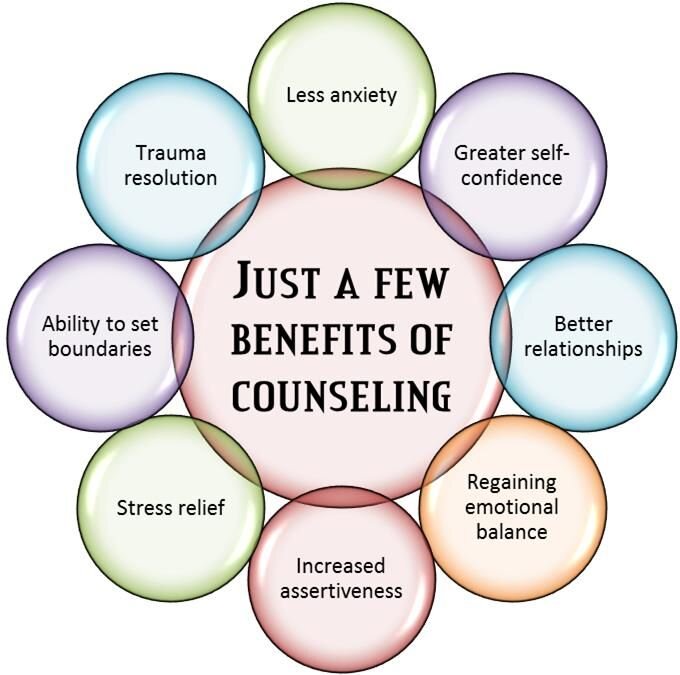Marriage Counselling vs. Couples Therapy: Key Differences
Unlocking the Secrets of Mental Health: An Overview of Counseling and Treatment Choices
Mental health is a facility and vital aspect of general well-being. Countless counseling and therapy choices exist to deal with different emotional obstacles. Each technique provides one-of-a-kind advantages and approaches customized to individual needs. Understanding these choices is essential for anyone seeking to improve their psychological health. Cognitive Behavioural Therapy. What variables should one consider when exploring these methods? The solution might expose a course to a much healthier emotional state
Understanding Mental Health And Wellness and Its Significance
Psychological health incorporates the psychological, mental, and social well-being of individuals, substantially affecting exactly how they believe, really feel, and act. Its relevance can not be overstated, as it impacts every aspect of life, including relationships, work performance, and general high quality of life. People with great mental wellness often tend to handle stress better, preserve healthier relationships, and make notified choices. On the other hand, poor psychological wellness can result in emotional distress, damaged performance, and numerous mental illness, which might require specialist intervention. Recognizing mental health and wellness is crucial for recognizing the indicators of distress and the demand for assistance. Awareness likewise promotes compassion and lowers stigma, encouraging individuals to look for help when essential. By prioritizing psychological health and wellness, communities can promote atmospheres that support emotional wellness, ultimately leading to healthier, a lot more durable individuals. This foundation acts as a critical step towards effective mental health and wellness counseling and treatment alternatives.
Sorts Of Counseling Approaches
Therapy strategies differ extensively, each customized to satisfy the one-of-a-kind needs of individuals seeking support. Among one of the most typical kinds are cognitive-behavioral treatment (CBT), which concentrates on recognizing and changing unfavorable thought patterns, and person-centered therapy, which highlights empathy and approval. Psychodynamic treatment discovers unconscious procedures and previous experiences to understand current habits, while solution-focused short treatment aims to determine services rather than examine problems.Additionally, household treatment addresses relational dynamics and interaction within families, promoting healthier communications. Group counseling offers a communal space for individuals to share experiences and sustain one an additional. Various other techniques consist of existential treatment, which encourages individuals to find definition and objective, and art or songs therapy, which utilizes innovative expression as a therapeutic device. Each approach provides distinct strategies and philosophies, permitting clients to find one of the most appropriate method for their individual growth and recovery journeys.
Discovering Various Therapy Techniques
In the domain of psychological health and wellness therapy, different treatment techniques supply distinctive approaches to therapy. Cognitive Behavior Therapy emphasizes the connection between ideas and actions, while Psychodynamic Therapy discovers subconscious impacts on emotional health. In Addition, Mindfulness-Based Methods promote present-moment recognition as a way to improve emotional regulation and general mental health.
Cognitive Behavior Therapy
Cognitive Behavior Modification (CBT) attracts attention as one of the most extensively exercised and researched methods in psychological health and wellness treatment. This technique concentrates on the affiliation in between feelings, habits, and ideas, stressing that modifying negative thought patterns can cause enhanced psychological health and behavioral adjustments. CBT is structured, generally including a restricted variety of sessions, and intends to equip people with practical skills to handle their signs. It is reliable for a selection of conditions, including anxiety disorders, clinical depression, and trauma. By making use of techniques such as cognitive restructuring and direct exposure treatment, CBT cultivates durability and encourages customers to challenge challenges head-on, making it a useful alternative in the landscape of psychological wellness therapies.
Psychodynamic Treatment Methods
Psychodynamic treatment strategies use a deep exploration of the unconscious mind and its influence on actions and psychological wellness. Rooted in Freudian theory, these methods emphasize the significance of early childhood years experiences and subconscious problems. Via methods such as free association, desire analysis, and transfer, individuals obtain understanding right into their thoughts and feelings, promoting self-awareness and understanding. This therapeutic method urges customers to reveal repressed feelings and unsettled issues, which can be essential in attending to existing mental obstacles. By examining the interplay between present behaviors and past experiences, psychodynamic treatment aims to promote psychological recovery and individual development. Eventually, it offers a framework for individuals to discover complex inner characteristics that influence their mental health and wellness.

Mindfulness-Based Methods
While conventional therapies usually concentrate on past experiences, mindfulness-based techniques prioritize present-moment awareness as a pathway to emotional well-being. These strategies, consisting of mindfulness-based cognitive therapy (MBCT) and mindfulness-based anxiety reduction (MBSR), urge individuals to engage totally with their thoughts and sensations without judgment. Professionals discover to observe their psychological states, promoting a better understanding of psychological triggers and actions. This technique not only eases signs and symptoms of stress and anxiety and anxiety but additionally improves overall psychological resilience. By incorporating mindfulness exercises, such as meditation and deep breathing, clients cultivate a sense of tranquility and quality. Ultimately, mindfulness-based techniques encourage people to browse life's obstacles with increased understanding and approval, promoting a much healthier partnership with their feelings and ideas.
The Duty of a Specialist or Counselor
A skilled specialist or therapist plays a necessary duty in supporting people with their mental wellness trips. They give a secure, non-judgmental area where customers can share their sensations and ideas honestly. Couples Therapy. By utilizing numerous restorative strategies customized per individual's needs, specialists aid clients discover underlying issues that might add to their mental health and wellness challenges.Therapists offer guidance and devices to deal with tension, anxiety, anxiety, and various other emotional problems. Their training equips them to identify patterns in habits and assumed procedures, assisting in understandings that cause individual development. They likewise promote a strong therapeutic alliance, which is essential for effective outcomes.Moreover, therapists continue to be dedicated to privacy and ethical requirements, ensuring a relying on atmosphere. Eventually, the role of a specialist or counselor is to encourage individuals, urging them to create resilience and much healthier coping approaches while guiding via life's intricacies
How to Pick the Right Counseling or Therapy Choice
Choosing the best counseling or therapy choice starts with examining private requirements. It is important to recognize individual obstacles and objectives prior to exploring different treatment designs. This foundational action can greatly affect the effectiveness of the selected approach.
Analyze Your Requirements

Just how can people efficiently analyze their psychological health and wellness requires when examining counseling or therapy choices? They ought to mirror on their psychological state and determine details concerns, such as clinical depression, partnership, or anxiousness difficulties. Journaling can be a helpful tool for tracking thoughts and feelings gradually. Additionally, individuals may gain from seeking feedback from relied on buddies or member of the family regarding viewed adjustments in habits or state of mind. It is additionally helpful to examine individual goals for therapy, such as enhancing coping abilities or getting understanding into personal patterns. Looking into various therapy modalities and my company their suitability for certain needs can help in making an educated option. Eventually, self-awareness plays a pivotal role in selecting the ideal course for psychological health assistance.
Discover Therapy Designs
While traversing the diverse landscape of therapy options, individuals need to think about different styles of counseling to locate the very best suitable for their special needs. Cognitive Behavior Therapy (CBT) concentrates on transforming adverse idea patterns, while Psychodynamic Treatment discovers unconscious processes and previous experiences. Humanistic strategies emphasize individual development and self-actualization, fostering an encouraging setting. Furthermore, mindfulness-based therapies grow present-moment recognition, aiding emotional regulation. For those seeking structure, Solution-Focused Short Treatment targets specific goals and solutions. Group treatment offers a communal setting for common experiences and assistance. Ultimately, individuals should assess their choices, convenience levels, and details difficulties, ensuring they select a restorative design that resonates with their personal trip toward psychological health.
Overcoming Barriers to Looking For Assistance

The Advantages of Therapy and Therapy for Psychological Health
Seeking assistance for psychological wellness challenges can bring about considerable enhancements in overall wellness. Therapy and therapy supply people with a risk-free area to discover their ideas and sensations, cultivating self-awareness and personal growth. These specialist solutions equip clients with dealing methods and analytic skills customized to their special situations.Moreover, treatment can lower symptoms of anxiousness, clinical depression, and other mental health problems, enhancing emotional durability. Routine sessions advertise responsibility and urge people to establish and accomplish individual goals. With numerous therapeutic methods, such as cognitive-behavioral treatment or mindfulness practices, clients learn to reframe adverse thoughts and develop much healthier behaviors.Additionally, the healing partnership itself can be a resource of assistance, helping to fight seclusion and loneliness. On the whole, involving in therapy and therapy is a proactive step toward attaining psychological health, allowing people to lead even more satisfying lives.
Often Asked Questions
How Much Time Does Counseling or Therapy Typically Last?
The duration of therapy or treatment varies substantially, commonly lasting from a few sessions to a number of months or years. Aspects affecting this include the person's specific requirements, the kind of therapy, and healing objectives.
What Should I Anticipate Throughout My First Session?
During the very first session, individuals can anticipate an introduction, conversation of worries, and the therapist's technique. They may finish evaluations and develop goals, cultivating a safe atmosphere for open communication and building relationship.

Exist Any Threats Related To Therapy?
Treatment can entail risks, such as psychological discomfort, susceptability, or challenging excruciating memories. While these challenges might occur, they can likewise lead to personal growth and recovery, making the therapeutic procedure complex yet possibly fulfilling.
How Can I Inform if My Specialist Is a Good Fit?
Establishing if a specialist is a good fit entails evaluating convenience, interaction style, and therapeutic technique. Favorable relationship and progress towards goals are indications of an appropriate match, vital for effective mental health assistance.
Will My Insurance Cover Therapy or Treatment Sessions?
Figuring out insurance protection for therapy or best site therapy sessions usually calls for contacting the insurance policy copyright straight. Plans vary substantially, so people ought to verify advantages, co-pays, and any type of essential pre-approvals prior to pursuing therapy solutions. Among the most common types are cognitive-behavioral treatment (CBT), which focuses on determining and altering unfavorable thought patterns, and person-centered therapy, which highlights compassion and approval. Psychodynamic therapy discovers subconscious processes and previous experiences to recognize current habits, while solution-focused quick treatment aims to identify options instead than explore problems.Additionally, family members treatment addresses relational dynamics and interaction within households, promoting much healthier communications. Other strategies consist of existential therapy, which motivates individuals to discover meaning and function, and art or songs treatment, which utilizes innovative expression as a healing device. Cognitive Behavior Treatment emphasizes the link between habits and ideas, while Psychodynamic Therapy checks out unconscious influences on psychological health. Cognitive Behavior Therapy (CBT) focuses on changing unfavorable thought patterns, while Psychodynamic Treatment checks out previous experiences and unconscious Going Here procedures.